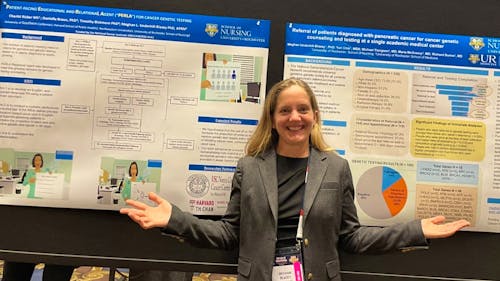Closing Gaps in Cancer Genetics: UR Nursing Researcher Helps Improve Access to Counseling Through Innovative Technology
By Gianluca D'Elia
Tuesday, January 16, 2024

This story is part of a series, Snapshots of Nursing Science, from the January 2024 issue of NURSING Magazine.
As an oncology nurse practitioner at the Wilmot Cancer Institute, Meghan Underhill-Blazey, PhD, APRN, FAAN, is passionate about the opportunity to facilitate genetic tests for individuals and families living with cancer.
These tests can check dozens of genes for several types of cancer, offering clarity for patients and families. A patient who has been diagnosed can find out whether they carry a genetic variant that could influence their treatment, or learn about the risk of recurrence or other cancers in the future. This information can also influence family members’ decisions to get screened, or life changes they might make to reduce their risks or prevent cancer.
“I get to meet generations of families, children, and siblings, and we get to look at the big picture and discuss the things we can do to change the family narrative,” she said.
However, less than half of people with cancer who are eligible for cancer genetic testing actually get tested. It’s not because they don’t want to.
“I have met very few people with cancer who have a family and are not interested in learning things that might help their loved one avoid the same experience,” said Underhill-Blazey.
Barriers such as access to care, time, lack of awareness, and whether a provider makes a referral often stand in the way.
With support from the National Cancer Institute, Underhill-Blazey and colleagues from the University of Southern California, Northeastern, Harvard, and the Dana-Farber Cancer Institute are developing technology that optimizes and improves access to genetic testing and counseling.
Titled the Patient-Facing Educational and Relational Agent (PERLA), the digital program will provide automated pre-test education on cancer genetics in both English and Spanish. In the form of an animated character that simulates a conversation between a patient and provider, the relational agent can be personalized for different types of cancer and stages, and culturally tailored.
PERLA will be especially important for patient populations that already face disparities in health care access and are traditionally underserved in genetics, such as non-English speakers and those who live in rural communities.
 Underhill-Blazey is also hopeful that PERLA can provide a sense of relief to patients who are likely overwhelmed by appointments and medical bills, and inundated with other information about their diagnosis.
Underhill-Blazey is also hopeful that PERLA can provide a sense of relief to patients who are likely overwhelmed by appointments and medical bills, and inundated with other information about their diagnosis.
“Using technology like this can allow people the space and time to better understand the content that provides them the information that they need for an informed health decision,” she said. “It allows them to revisit it, and to do it in a time when they are not so overburdened. A family member could watch with them too.”
The tool also helps address a national shortage of genetics professionals, which leads to longer wait times for patients. Researchers envision PERLA helping health care systems meet the growing demand for genetic counseling, and helping patients get testing and results in a timelier manner.
As Underhill-Blazey and fellow cancer genetics experts work toward a future where testing and counseling are easier to access, nurses and nurse scientists will be a key part of supporting their efforts, she said.
“Nurses are a huge, important part of cancer care,” she said.
That means nurses are in an ideal position to implement changes.
“It’s important to have nurse navigators and nurses at the frontline who understand the benefits of genetic information to the patient and the family," Underhill-Blazey said. "They can take on a leadership role in ensuring that cancer genetics care is provided to patients."
Categories: Research

